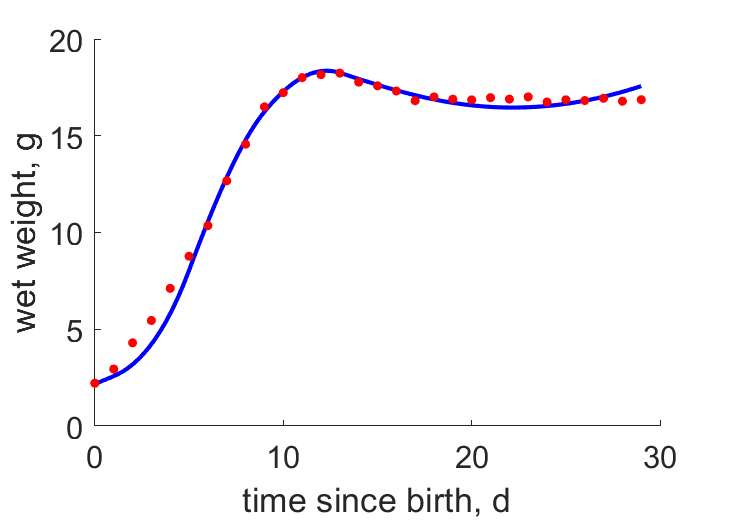Predictions & Data for this entry
| Model: std | climate: B, C | migrate: | phylum: |
| COMPLETE = 2.5 | ecozone: THp, TPa | food: biCi | class: |
| MRE = 0.010 | habitat: 0iTd, 0iThh, 0iTg | gender: Dg | order: |
| SMSE = 0.000 | embryo: Tnsf | reprod: O | family: |
Zero-variate data
| Data | Observed | Predicted | (RE) | Unit | Description | Reference |
|---|---|---|---|---|---|---|
| ab | 14 | 14.11 | (0.007945) | d | age at birth | StarKoni2008 |
| tx | 14 | 14.11 | (0.008125) | d | time since birth at fledging | StarKoni2008 |
| tp | 42 | 41.59 | (0.009724) | d | time since birth at puberty | guess |
| tR | 365 | 365 | ( 0) | d | time since birth at 1st brood | AnAge |
| am | 3212 | 3214 | (0.0007385) | d | life span | AnAge |
| Wwb | 2.2 | 2.17 | (0.01364) | g | wet weight at birth | StarKoni2008 |
| Wwi | 21 | 21.25 | (0.01212) | g | ultimate wet weight | StarKoni2008 |
| Ri | 0.03425 | 0.03425 | (0.0001887) | #/d | maximum reprod rate | StarKoni2008 |
Uni- and bivariate data
| Data | Figure | Independent variable | Dependent variable | (RE) | Reference |
|---|---|---|---|---|---|
| tW_a |  | time since birth | wet weight | (0.02373) | StarKoni2008 |
Pseudo-data at Tref = 20°C
| Data | Generalised animal | Saxicola torquatus | Unit | Description |
|---|---|---|---|---|
| v | 0.02 | 0.04079 | cm/d | energy conductance |
| p_M | 18 | 439.8 | J/d.cm^3 | vol-spec som maint |
| k_J | 0.002 | 0.01849 | 1/d | maturity maint rate coefficient |
| k | 0.3 | 0.3075 | - | maintenance ratio |
| kap | 0.8 | 0.8636 | - | allocation fraction to soma |
| kap_G | 0.8 | 0.8007 | - | growth efficiency |
| kap_R | 0.95 | 0.95 | - | reproduction efficiency |
Discussion
- Body temperature is guessed
- Feeding is reduced towards end of nestling period
- mod_1: v is reduced
- mod_1: Pseudo-data point k is used, rather than k_J; Data set tp and parameter t_R are added, the latter replacing clutch interval t_N. Postnatal T is based on PrinPres1991, see get_T_Aves. See further the revision page, theme puberty
Bibliography